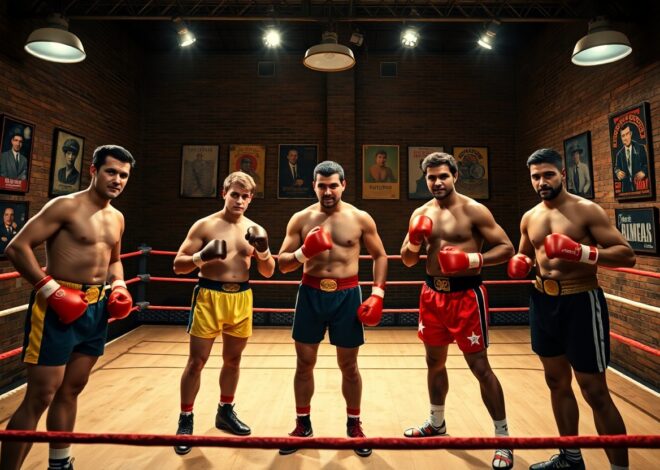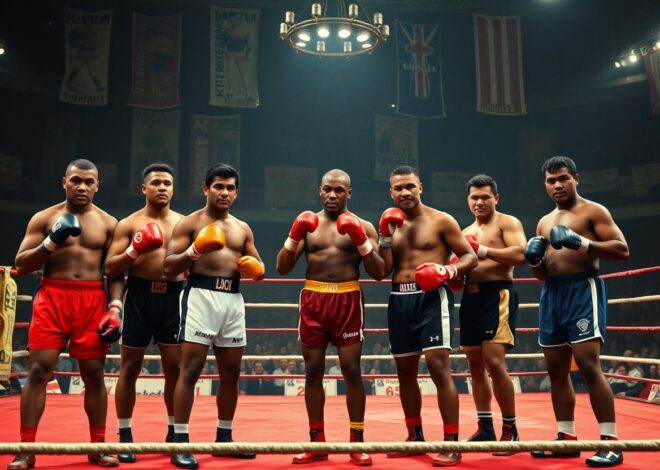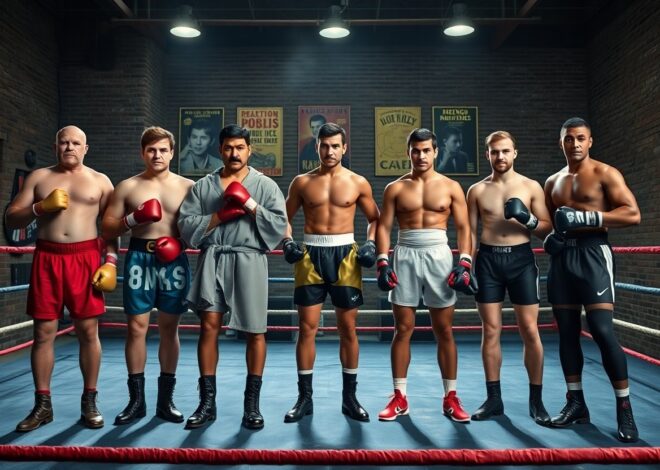
Boxing’s Greatest Underdogs – Fighters Who Defied the Odds
Many of boxing’s most inspiring stories come from fighters who refused to accept defeat before the first bell. When you look at the sport’s rich history, you’ll find remarkable tales of underdogs who transformed from heavy betting longshots into legendary champions. These warriors stepped into the ring facing overwhelming odds, yet emerged victorious through sheer determination, unwavering heart, and extraordinary resilience. Their triumphs remind you that in boxing, as in life, the size of the fight in the dog often matters more than the size of the dog in the fight.
Defining the Underdog Archetype in Boxing
The Essence of an Underdog
Boxing’s underdogs embody more than just unfavorable odds – they represent the raw spirit of determination against overwhelming challenges. These fighters typically face opponents with superior records, physical advantages, or more extensive resources. You’ll recognize them by their unwavering resilience and ability to transform perceived weaknesses into strategic advantages. The underdog archetype resonates deeply because it mirrors life’s universal struggles, where heart and determination can triumph over seemingly insurmountable odds.
Historical Context of Underdogs in the Sport
Throughout boxing’s rich history, underdogs have shaped the sport’s most memorable moments. From James “Buster” Douglas’s shocking victory over Mike Tyson in 1990 to Hasim Rahman’s unexpected knockout of Lennox Lewis in 2001, these victories have defined boxing’s unpredictable nature. You’ll find that many of these historic upsets occurred during boxing’s golden ages, when rigid hierarchies and established champions seemed unbeatable.
The evolution of underdog victories mirrors boxing’s transformation from bare-knuckle brawls to scientific strategy. The 1920s and 30s saw fighters like James J. Braddock rise from poverty to championship glory, while the modern era has witnessed technological advances enabling underdogs to study and exploit champions’ weaknesses. Your understanding of these historic shifts reveals how underdogs have consistently adapted, using innovation and determination to overcome established champions.
Iconic Underdog Triumphs That Shook the Boxing World
Boxing’s history glitters with moments where underdogs flipped the script, transforming themselves from unlikely challengers to legendary champions. These victories didn’t just change records – they redefined what’s possible in the ring and inspired generations of fighters to believe in the power of determination and heart over odds and expectations.
The Rumble in the Jungle: Foreman vs. Ali
Muhammad Ali’s victory over George Foreman in Zaire stands as boxing’s greatest strategic masterpiece. At 32, Ali faced a seemingly invincible Foreman who had demolished Joe Frazier and Ken Norton. Using his famous “rope-a-dope” technique, Ali absorbed Foreman’s punches while conserving energy, before launching a stunning eighth-round knockout that reclaimed his heavyweight crown and proved that brains could triumph over brute force.
Buster Douglas’ Upset Against Mike Tyson
On February 11, 1990, in Tokyo, James “Buster” Douglas shocked the world by knocking out the undefeated and seemingly unstoppable Mike Tyson. As a 42-1 underdog, Douglas weathered Tyson’s early assault and delivered a devastating combination in the 10th round that sent the champion crashing to the canvas.
Douglas’s preparation for this fight carried extra emotional weight – his mother had passed away just 23 days before the bout. Despite personal tragedy, he trained with unprecedented focus and determination. You can see the technical brilliance in how Douglas used his superior reach and jab to keep Tyson at bay, demonstrating that proper strategy and self-belief can overcome even the most intimidating opponents in boxing history.
Lesser-Known Underdogs Who Made Their Mark
The Rise of James Braddock
During the Great Depression, James J. Braddock emerged from poverty to become the “Cinderella Man” of boxing. After losing 23 of his first 44 fights, Braddock stunned the world by defeating heavyweight champion Max Baer in 1935. Working as a longshoreman between fights to feed his family, Braddock’s resilience and determination captured America’s imagination. His journey from the relief lines to heavyweight glory remains one of boxing’s most inspiring tales.
Sergio Martinez’s Journey from Underdog to Champion
Argentina’s Sergio Martinez didn’t start boxing until age 20, far later than most champions. Despite this late start, Martinez rose from obscurity to become middleweight champion at age 35. His unorthodox style and lightning-quick reflexes helped him overcome bigger, younger opponents on his way to the top.
You might find it fascinating that Martinez worked as a bicycle messenger and construction worker in Spain while pursuing his boxing dreams. His breakthrough came when he defeated Kelly Pavlik in 2010 to claim the middleweight crown, followed by a series of spectacular defenses including a stunning second-round knockout of Paul Williams. Martinez’s success proved that conventional wisdom about age and experience doesn’t always apply in boxing.
Analyzing the Underdog Mindset: Mental Fortitude in the Ring
Psychological Factors That Fuel Upsets
The underdog mindset thrives on a unique combination of psychological elements that transform perceived disadvantages into powerful motivators. Here are the key factors:
- Pressure-free mentality – underdogs often perform better without expectations
- Intense determination – fueled by being overlooked and doubted
- Emotional resilience – ability to bounce back from setbacks
- Adaptive thinking – finding creative solutions against favored opponents
Recognizing these mental attributes helps explain how underdogs consistently defy overwhelming odds.
Training Strategies Employed by Underdogs
Underdog fighters typically adopt unconventional training methods to overcome their perceived limitations. Their preparation often includes specialized conditioning to outlast favorites, situational sparring against larger opponents, and developing counter-fighting techniques specifically designed to neutralize their opponent’s strengths.
These fighters frequently incorporate high-intensity interval training, altitude preparation, and unorthodox movement drills into their regimens. You’ll find them working with trainers who specialize in exploiting weaknesses in supposedly superior opponents. Their camps focus heavily on mental conditioning and visualization techniques, preparing for every possible scenario they might face in the ring. This comprehensive approach helps level the playing field against more acclaimed opponents.
Lessons from Boxing’s Underdogs for Life Beyond the Ring
Resilience and Grit in Personal Challenges
Boxing’s greatest underdogs teach us that setbacks forge strength. When you face your own obstacles, channel James “Buster” Douglas’s mindset after his mother’s death before the Tyson fight – use personal struggles as fuel for unprecedented determination. Your perceived disadvantages can become advantages when you embrace them fully. The ring’s underdogs show that preparation and self-belief matter more than others’ expectations of your capabilities.
The Underdog Mentality in Business and Sport
Your competitive edge often lies in being underestimated. Just as boxing underdogs study their favored opponents obsessively, you can turn market leader complacency into opportunity. Companies like Apple in its early days and Tesla as an automotive outsider demonstrated how innovative thinking and relentless drive can disrupt established champions. The underdog advantage means you’ll work harder, think smarter, and take calculated risks that comfortable leaders won’t consider.
This mindset transforms into tangible success when you adopt specific strategies: identifying unique strengths others overlook, developing unconventional approaches to common challenges, and maintaining unwavering focus despite skepticism. Consider how Netflix outmaneuvered Blockbuster or how Southwest Airlines carved its niche – they succeeded by embracing their outsider status and rewriting industry rules, just as boxing’s greatest underdogs rewrote their destinies in the ring.
To wrap up
Hence, as you’ve discovered through these remarkable tales of triumph, boxing’s greatest underdogs have shown you that heart and determination can overcome any odds. From Buster Douglas shocking the world against Mike Tyson to James Braddock’s inspirational rise from poverty to heavyweight champion, these fighters have proven that your mindset matters more than predictions. Their stories continue to inspire modern athletes and demonstrate that with unwavering self-belief and relentless preparation, you can defy expectations and create your own legacy in the ring.



